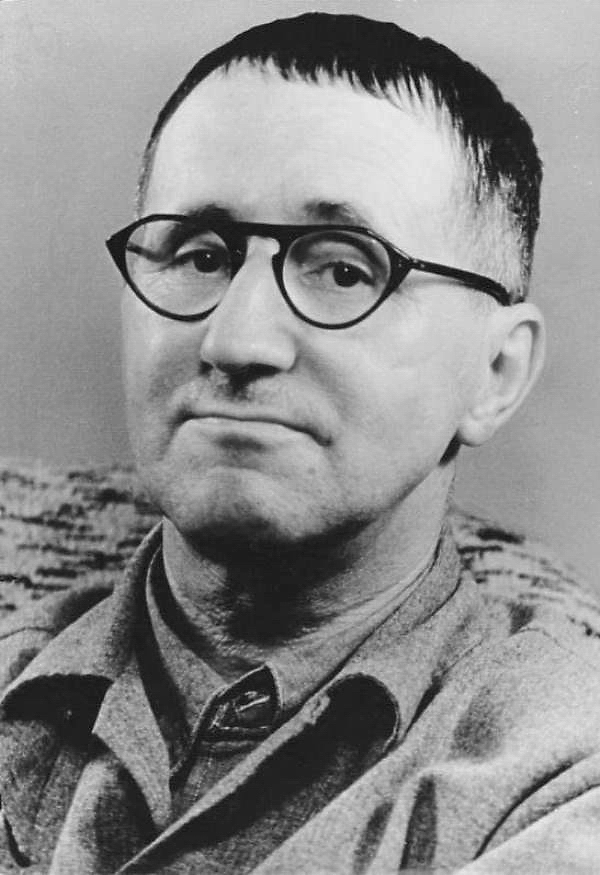
Bertolt Brecht
 Eugen Berthold Friedrich Brecht ; .}} (10 February 1898 – 14 August 1956), known as Bertolt Brecht and Bert Brecht, was a German theatre practitioner, playwright, and poet. Coming of age during the Weimar Republic, he had his first successes as a playwright in Munich and moved to Berlin in 1924, where he wrote ''The Threepenny Opera'' with Elisabeth Hauptmann and Kurt Weill and began a life-long collaboration with the composer Hanns Eisler. Immersed in Marxist thought during this period, Brecht wrote didactic ''Lehrstücke'' and became a leading theoretician of epic theatre (which he later preferred to call "dialectical theatre") and the .
Eugen Berthold Friedrich Brecht ; .}} (10 February 1898 – 14 August 1956), known as Bertolt Brecht and Bert Brecht, was a German theatre practitioner, playwright, and poet. Coming of age during the Weimar Republic, he had his first successes as a playwright in Munich and moved to Berlin in 1924, where he wrote ''The Threepenny Opera'' with Elisabeth Hauptmann and Kurt Weill and began a life-long collaboration with the composer Hanns Eisler. Immersed in Marxist thought during this period, Brecht wrote didactic ''Lehrstücke'' and became a leading theoretician of epic theatre (which he later preferred to call "dialectical theatre") and the .When the Nazis came to power in Germany in 1933, Brecht fled his home country, initially to Scandinavia. During World War II he moved to Southern California where he established himself as a screenwriter, while also being surveilled by the FBI. In 1947, he was part of the first group of Hollywood film artists to be subpoenaed by the House Un-American Activities Committee for alleged Communist Party affiliations. The day after testifying, he returned to Europe, eventually settling in East Berlin where he co-founded the theatre company Berliner Ensemble with his wife and long-time collaborator, actress Helene Weigel. Provided by Wikipedia
1
2
3
by Brecht, Bertolt, 1898-1956 1898-1956
Published: Berlin [u.a.] : Aufbau-Verl. [u.a.]
Frankfurt am Main
Published: Berlin [u.a.] : Aufbau-Verl. [u.a.]
Frankfurt am Main
Book
4
5
Book
6
7
8
9
10
by Brecht, Bertolt, 1898-1956 1898-1956
Published in: Encounter. - ed. by Stephen Spender [u.a.] 1984,62.2, S. 13 - 17
Published in: Encounter. - ed. by Stephen Spender [u.a.] 1984,62.2, S. 13 - 17
Article
11
Book
12
13
14
15
16
Published: Berlin : Eulenspiegel-Verl, 1994
Other Authors:
“...Brecht, Bertolt, 1898-1956 1898-1956...”
Book
17
Published: Zürich : Sanssouci-Verlag, 1962
Other Authors:
“...Brecht, Bertolt, 1898-1956 1898-1956...”Inhaltsverzeichnis
Book
18
Published in: Briefe an Bertolt Brecht im Exil
2
Other Authors:
“...Brecht, Bertolt, 1898-1956 1898-1956 Adressat...”
Book
19
Published: Berlin [u.a.] : de Gruyter
Other Authors:
“...Brecht, Bertolt, 1898-1956 1898-1956 Adressat...”
Book
20
Published in: Briefe an Bertolt Brecht im Exil
1
Other Authors:
“...Brecht, Bertolt, 1898-1956 1898-1956 Adressat...”
Book

